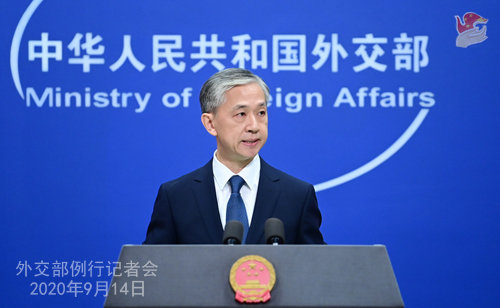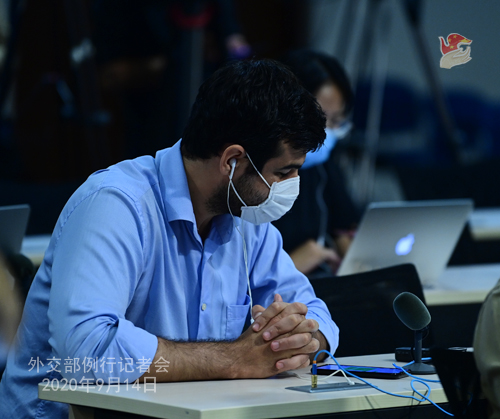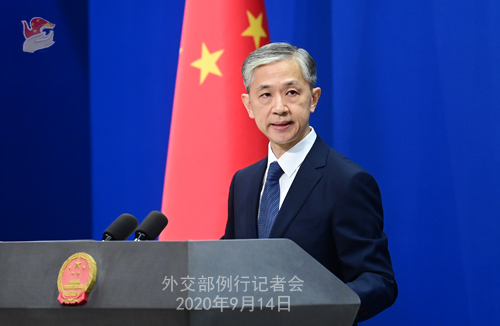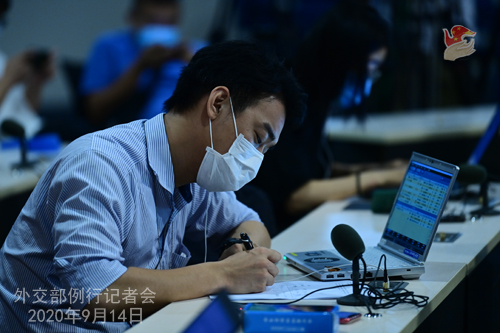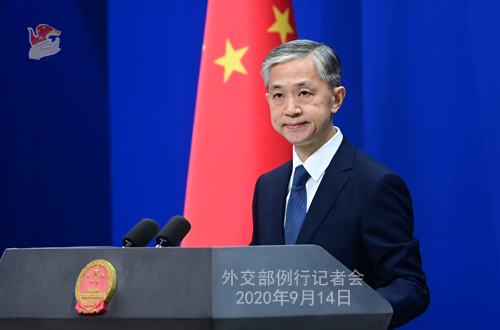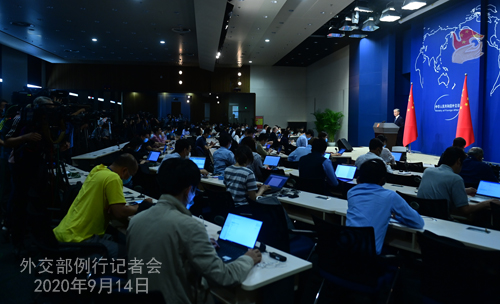| Foreign Ministry Spokesperson Wang Wenbin's Regular Press Conference on September 14, 2020 |
| 2020-09-14 23:34 |
|
Xinhua News Agency: How does China view State Councilor and Foreign Minister Wang Yi’s visit to Russia? Did the two sides reach some agreement? What signals did this visit send out given the current situation? Wang Wenbin: Under the strategic leadership of President Xi Jinping and President Putin, China-Russia relations have withstood the test of the pandemic and the changing international landscape and grown more mature, stable, vibrant and resilient. During State Councilor and Foreign Minister Wang Yi’s visit to Russia, he had in-depth discussions and compared notes with Foreign Minister Lavrov on bilateral relations and regional and international issues of common interest. The two sides reached important consensus and issued a joint statement, specifying the common position of both sides on world challenges and sending a strong signal of China and Russia upholding multilateralism, the authority of international law and basic norms governing international relations. The COVID-19 pandemic is accelerating unprecedented changes in the world, and the international community is faced with a historical choice between multilateralism and unilateralism, cooperation and confrontation. China and Russia have been firmly supporting each other, jointly safeguarding the central role of the UN, and staying committed to multilateralism, international fairness and justice, which is important for upholding international strategic balance and stability as well as rejecting unilateralism and bullying practices. China will continue working with Russia to uphold, consolidate and advance bilateral ties, deepen mutual political trust and strategic coordination, and draw up blueprints for exchange and cooperation across the board. Together we are supporters of international anti-epidemic cooperation, exemplars of harmonious co-existence of major countries, champions of advanced technologies and guardians of international fairness and justice. Middle East News Agency: Israel and Bahrain agreed on Friday to establish diplomatic ties. This agreement came about a month after a similar deal between Israel and the UAE. Do you have any comment on that? Wang Wenbin: China noted media reports on that. We are pleased to see measures that help to de-escalate tensions in the Middle East and promote regional peace and stability. We hope the pertinent sides can make concrete efforts to take the Palestinian issue back to the track of equal-footed dialogue and negotiation at an early date. China’s position on the Palestinian issue is consistent and clear. We will continue firmly supporting the Palestinian people in their just efforts to restore their lawful rights and establish an independent state. China will continue to play a positive and constructive role to this end.
NHK: First question, Yoshihide Suga is elected head of Japan’s Liberal Democratic Party and poised to become the next prime minister. What is China’s comment? Second, ByteDance has reportedly rejected Microsoft’s purchase and decided to sell TikTok’s US business to Oracle. Can you comment on that? Third, families of 12 Hong Kong “pro-democracy” activists detained by the Chinese authorities said the meeting requests raised by their lawyers were denied. The US Secretary of State Pompeo also raised concerns over this. Is the foreign ministry aware of this and what’s your comment? Wang Wenbin: On your first question, we noted the result of the election and congratulate Mr. Yoshihide Suga for his election as head of the Liberal Democratic Party. We are ready to work with Japan’s new party and government leadership to continue observing the four political documents between China and Japan, deepen bilateral cooperation on fighting the virus and growing the economy, and steadily improve China-Japan relations. On your second question, China’s position on TikTok has been made clearly on multiple occasions. The “hunting” against TikTok in the US is typical “coerced transaction by government”. On the one hand, certain US politicians have been preaching so-called fairness, reciprocity and the building of a “Clean Network”. On the other hand, without any evidence, they have been abusing national power under the pretext of national security to suppress and coerce non-American companies that have a cutting edge of a particular field. This fully reveals their hideous agenda of robbery and economic bullying. China firmly opposes that and will firmly support the pertinent companies in safeguarding their legitimate rights and interests and uphold international economic and trade rules. We urge the US government to provide an open, fair, just and non-discriminatory business environment for foreign companies operating in the country. We won’t comment on the specific business transaction of relevant company you mentioned. On your third question, the Yantian branch of Shenzhen’s public security bureau issued a notice on September 13. Suspected of illegally crossing the border, the persons involved haven been subjected to compulsory measures of criminal detention in accordance with law. The case is being investigated, and the public security organs protect the suspects’ legitimate rights and interests according to law. I’ll leave the specifics to the competent authorities. I’d like to reiterate that Hong Kong affairs are entirely domestic affairs that allow no unwarranted comments from external forces. We urge the US to faithfully abide by international law and basic norms governing international relations, and stop in any way interfering in China’s internal affairs including Hong Kong affairs. CCTV: We noted that during State Councilor and Foreign Minister Wang Yi’s visit to Russia, the Russian side responded positively to China’s Global Initiative on Data Security. Could you give us more details? What consensus have the two countries reached on safeguarding cyber and information security? Wang Wenbin: Cyber and information security is a key area for China-Russia cooperation. During his visit to Russia, State Councilor and Foreign Minister Wang Yi had in-depth communications and reached many important consensuses with Russian Foreign Minister Sergei Lavrov. The Russian side appraised the Chinese side’s Global Initiative on Data Security and welcomed China’s efforts to strengthen global data security. The two sides call for global data security rules that reflect the will of all countries and respect the interests of all parties on the basis of universal participation. China and Russia believe that the UN should play a crucial role in addressing global information security threats and agree to step up cooperation in regional and international multilateral frameworks including the UN, BRICS, SCO, ASEAN Regional Forum (ARF), etc. Both sides oppose the oppression against others under the pretext of national security and spreading of disinformation by certain country, and call on the international community to create an open, fair, just and non-discriminatory environment for the development and use of information technology and create a peaceful, secure, open and cooperative cyber space.
Bloomberg: According to media reports, some of the soldiers in the Indian border troops were “Tibetans-in-exile”. What is the Foreign Ministry’s stance on this? Wang Wenbin: My colleagues took similar questions before. I’m not aware of the specifics of the Tibetans-in-exile you asked about. You may raise this question to the Indian side. China’s position is clear: we firmly oppose any country facilitating through any means the “Tibetan independence” forces’ separatist activities. Macau Monthly: The UN General Assembly on Friday voted overwhelmingly with 162-2 to adopt a resolution calling for intensified international cooperation and solidarity in response to COVID-19. The US and certain other country were the only countries that voted against the resolution. Do you have any comment? Wang Wenbin: On September 11, the 74th session of the UN General Assembly voted to pass an omnibus resolution on COVID-19 with a majority of 169. The resolution identifies international cooperation, multilateralism and solidarity as the only way for the world to effectively respond to global crises such as COVID-19. It urges member states to promote inclusion and unity in response to COVID-19, reject racism, xenophobia, hate speech, violence and discrimination, refrain from promulgating and applying any unilateral economic, financial or trade measures not in accordance with international law and the UN Charter, and calls on them to enable all countries to have unhindered, timely access to quality, safe, efficacious and affordable diagnosis, therapeutics, medicines and vaccines. The resolution was passed with an overwhelming majority, which once again reflects the position of the vast majority of the UN members and the extensive consensus of the international community, that is, only through solidarity and cooperation can we defeat the virus, the common enemy of mankind. The result of the vote indicates that a just cause rallies abundant support while an unjust cause finds little. The US has wantonly withdrawn from international treaties and organizations and shifted blame to other countries amid the COVID-19 pandemic and deliberately sabotaged international solidarity and cooperation against the virus, which is entirely unpopular as such behaviors go against the will of the international community. We hope the US will heed the just call from the international community, rectify its wrong, selfish practice of rumor-mongering, smearing and blame-shifting, and stop unilateral sanctions in violation of international law and basic norms of international relations. It should support rather than impede international solidarity and cooperation against COVID-19. Reuters: There are reports that the current US Ambassador Terry Branstad will be leaving his post. Any comment on this? Wang Wenbin: We noted the tweet by the US side and have not yet received notification about the end of Ambassador Branstad’s tenure.
CRI: The first intra-Afghan negotiations opened in Doha, Qatar on September 12. Does China have any expectation for the prospect of these negotiations? State Councilor and Foreign Minister Wang Yi said in a video message that China will continue to be a supporter, mediator and facilitator of the Afghan peace and reconciliation process. Does the Chinese side have any specific consideration or plan to this end? Wang Wenbin: China expresses congratulations for the opening of the intra-Afghan negotiations. Just as a Chinese poem reads, “We remain brothers after all the vicissitudes; let's forgo our old grudges, smiling we meet again.” Both parties of the intra-Afghan negotiations are brothers. After all these years of twists and turns, they finally came to the negotiating table and opened a new chapter in the peace and reconciliation process in Afghanistan. History has proved time and again that peace in Afghanistan cannot be achieved by military means and that a political settlement is the only correct way forward. It is hoped that the two sides will bear in mind the interests of their country and nation, work together to achieve outcomes and peace in these negotiations, build an inclusive political architecture for the future that is widely accepted and participated in by all parties in Afghanistan, stay committed to combating terrorism, pursue a foreign policy of peace and friendship, and help Afghanistan to embark on the road of peaceful development in real earnest. China is a traditional friendly neighbor and sincere friend of Afghanistan. As State Councilor and Foreign Minister Wang Yi said in his speech at the opening ceremony of the intra-Afghan negotiations, China sincerely hopes that the two sides of the Afghan peace talks will seek common ground while shelving and narrowing differences, turn their swords into ploughshares and find an effective political solution to the Afghan issue as soon as possible. China always respects the independent choice of the Afghan people, firmly supports the "Afghan-led, Afghan-owned" peace and reconciliation process, and will continue to be a supporter, mediator and facilitator of the process as always. AFP: Could you give further details on the reciprocal restrictions on US diplomats in China announced last week? Could you confirm that Bytedance will not sell its US operation to either Oracle or Microsoft? Wang Wenbin: On the US restrictions on the Chinese embassy and consulates in the US and their personnel you mentioned, just as the Chinese side pointed out, since October last year, the US Department of State has imposed multiple rounds of restrictions on the normal performance of duties by the Chinese embassy and consulates in the US and their personnel. The US practice has severely violated international law and basic norms governing international relations and disrupted China-US relations and normal exchanges between the two sides. To urge the US to repeal its wrong decisions as soon as possible, the Chinese side has recently sent a diplomatic note announcing reciprocal restrictions on US embassy and consulates, the consulate-general in Hong Kong included, as well as their personnel. Relevant measures apply to senior diplomats and all other personnel. It must be stressed that these measures are China's legitimate and necessary response to the erroneous US moves. China will continue to support normal exchange and cooperation between all sectors of the two countries and the Chinese embassy and consulates will maintain normal interaction with all sectors in the US. Once again we urge the US side to immediately correct its mistakes and lift the unreasonable restrictions imposed on the Chinese embassy and consulates and their staff. China will make reciprocal responses to US actions. As for TikTok, I already responded to that just now. Phoenix TV: Could you give us any details about the specific arrangement of the upcoming World Economic Forum Special Virtual Dialogue with Global Business Leaders tomorrow? Who are the representatives from the business community? Does China have any expectations for the dialogue and what message will it send to them? Wang Wenbin: The World Economic Forum will hold the Special Virtual Dialogue with Global Business Leaders on September 15, where Premier Li Keqiang is invited to have discussions with the business leaders attending the meeting, and Executive Chairman of the World Economic Forum Klaus Schwab will host the dialogue. At present, the COVID-19 pandemic is still wreaking havoc around the world, and the global economy has slipped into deep recession and economic globalization is facing headwinds. The international community, especially multinational companies, are closely following China's economic prospects and policy with expectations to share more opportunities presented by China's development. Premier Li Keqiang will deliver an important speech at the dialogue, putting forward his views on international landscape, briefing on China's measures to coordinate epidemic control efforts and socio-economic development and the results they achieved, explaining China's economic development policies, and discussing issues to the interest of the business community. It is believed that the dialogue will help the international community to have a more comprehensive and accurate understanding of China's economic situation and policies, deepen cooperation between China and the rest of the international community, especially the global business community, and help all parties work together to build an open world economy, jointly respond to crises and challenges and send a message of confidence and positive energy to the world. As for the specific arrangements you mentioned, I believe relevant authorities will release information in a timely manner.
Bloomberg: The US Under Secretary of State Keith Krach could lead a delegation to visit Taiwan for talks later this month, according to Taiwan media reports. What is the ministry’s comment on this proposed trip by the under secretary? Wang Wenbin: China firmly opposes official exchanges between the US and Taiwan. This position is consistent and clear. I would like to stress once again that the Taiwan question bears on China's sovereignty and territorial integrity and concerns China's core interests. It is the most important and sensitive issue in China-US relations. The one-China principle is the political foundation of China-US relations. We urge the US side to abide by the one-China principle and the three China-US joint communiques, and to stop all forms of official ties between the US and Taiwan so as to avoid serious damage to China-US relations and peace and stability across the Taiwan Strait. The Paper: The US Department of State tweeted on September 13 that “we released a new webpage that illustrates the Chinese Communist Party’s abuses perpetrated against Uyghurs and members of other minority groups in Xinjiang.” The department spokesperson Ortagus on the same day wrote on Twitter that “the Chinese Communist Party continues to commit egregious human rights abuses in Xinjiang”, and that the United States is taking actions. I wonder what is your comment on that? Wang Wenbin: The US Department of State’s webpage on Xinjiang is full of lies and rumors. Over the past four decades, the Uyghur population in Xinjiang grew from 5.55 million to over 12 million, registering a more than 100 percent increase. There are about 24,000 mosques in Xinjiang, more than 10 times of that in the United States; there’s one mosque for every 530 Muslims in Xinjiang, which is higher than that of many Muslim countries. The rights and interests of ethnic minority workers from Xinjiang, who are part of China's large workforce, are protected by China's Labor Law and Labor Contract Law. Turning a blind eye to these facts, the US State Department is stigmatizing the human rights situation in Xinjiang and pinning labels of “forced sterilization”, “repression of religious freedom” and “forced labor”, which are nothing but rumors and slanders. The US State Department webpage on Xinjiang also conceals the truth. Over the past 60 years or so, Xinjiang’s economy grew by more than 200 times, lifting over 3 million people out of poverty, and residents’ life expectancy increased from 30 to 72 years. The counter-terrorism and de-radicalization measures taken by the Xinjiang local governments in recent years produced remarkable results, and the region hasn’t seen a single terrorist attack during the past 4 years or so. In 2019, Xinjiang received over 200 million domestic and foreign visitors. Since the end of 2018, nearly 1,000 foreign nationals from over 90 countries visited Xinjiang in more than 70 groups and saw with their own eyes the stability and prosperity Xinjiang enjoys. At the UN Human Rights Council session in July this year, 46 countries in their joint statement applauded Xinjiang’s counter-terrorism and de-radicalization achievements and supported the Chinese government’s Xinjiang policy. The US State Department, turning a deaf ear to all these facts and truth, is trying its best to vilify the image of Xinjiang. It reveals that the true agenda of the US is not caring for the human rights situation in Xinjiang, but undermining the region’s prosperity and stability and containing China’s development under the pretext of human rights. The US also vilifies China’s Xinjiang policy as “terrorism” while it is exactly the US itself that bolsters terrorists. The US diplomatic envoys have recently been meeting East Turkestan forces and blatantly supporting terrorist and separatist forces, which clearly exposes their double standard on counter-terrorism. Xinjiang-related matters are China’s internal affairs that allow no foreign interference. China once again urges the US to stop political manipulation and interference in China’s internal affairs under the pretext of Xinjiang-related matters. The attempts to undercut Xinjiang’s prosperity and stability and to obstruct China’s growth will never succeed.
|
| |||||||||||||||
|
|||||||||||||||


